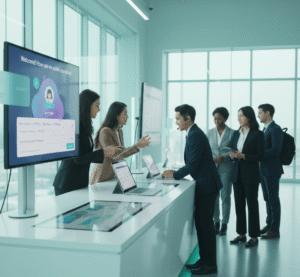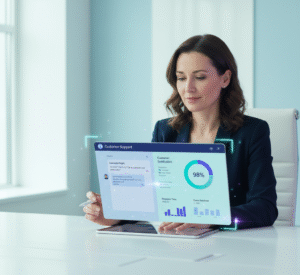“Discover how AI Agents for PPC are transforming paid advertising by automating optimization, enhancing targeting, and boosting ROI through smart, data-driven strategies.”
Paid advertising has always been a fast-paced world. Marketers constantly juggle budgets, bids, ad copy, and targeting. It’s a never-ending cycle of optimization. Yet, despite all the effort, traditional ad spend often falls short. Many businesses see their money disappear with little to show for it. Why does this happen? Usually, it’s due to poor targeting, slow optimization cycles, and fragmented campaign insights. These issues lead to wasted budgets and missed opportunities. Some estimates suggest that as much as 40% of ad spend can be lost because of these inefficiencies.
But what if there were a way to make paid advertising smarter, faster, and more effective? What if you had marketing experts working around the clock, making real-time adjustments and using data to make knowledgeable decisions? This is where AI agents step in. These sophisticated tools are fundamentally changing how businesses approach paid advertising. They’re not just automating tasks; they’re revolutionizing campaign optimization, sharpening targeting, and boosting your return on investment (ROI) through data-driven insights.
This article will dive deep into the world of AI agents for paid advertising. We’ll explore their capabilities, look at practical applications, and discuss how they’re reshaping the landscape of digital marketing. You’ll gain valuable insights and see real-world examples that illustrate the immense benefits and straightforward implementation of AI agents in your paid ad campaigns.
Understanding the Shift: From Manual to Autonomous
For years, paid advertising has relied on human expertise and manual adjustments. Marketers set up campaigns, monitor performance, and make changes based on their observations. This approach is reactive and often slow. When a human identifies a trend or an issue, valuable ad spend might have already been wasted.
Traditional ad management also faces limitations in scale and complexity. Running multiple campaigns across various platforms, with countless ad variations and audience segments, quickly becomes overwhelming. Analyzing vast amounts of data to uncover subtle patterns is a Herculean task for any human team.
AI agents change this dynamic entirely. Think of them as autonomous systems. They don’t just follow instructions; they make decisions, take actions, and continuously optimize campaigns without constant human supervision. They are built with intelligence engines, often powered by large language models, that allow them to reason and understand marketing objectives. They connect with your marketing systems through APIs, enabling them to execute changes directly. Furthermore, sophisticated memory systems allow them to learn from past performance, and decision-making frameworks guide their actions based on your company’s rules and goals.
This isn’t merely automation; it’s a paradigm shift towards proactive, intelligent optimization.
What Exactly Are AI Agents?
I’m confusing AI agents with other AI tools like chatbots or assistants. It is easy. Let’s clarify the distinctions:
- AI Chatbots: These are relatively basic. They respond to queries with pre-programmed answers or draw from a limited knowledge base. Their interaction is usually confined to a chat interface.
- AI Assistants: More advanced than chatbots, AI assistants can generate responses and provide recommendations. They might help draft content or suggest strategies. However, they typically don’t take independent actions outside of their interface. A human still needs to approve and implement their suggestions.
- AI Agents: These are the game-changers. AI agents combine sophisticated reasoning with the ability to interact across multiple systems. They proactively identify opportunities and issues, then implement changes autonomously. For example, an AI agent managing an email campaign for a seasonal product wouldn’t just suggest content. It would monitor engagement rates, create personalized content variations, determine optimal send times, and adjust its approach continuously based on performance. All of this happens without a human needing to intervene.
In essence, AI agents function as “cybernetic teammates.” Research from institutions like Harvard and companies such as Procter & Gamble (P&G) suggests that these agents can replicate the benefits of human collaboration. They help professionals transcend traditional functional boundaries, allowing commercial specialists to develop technical solutions and technical experts to create commercially viable proposals.
Core Capabilities: How AI Agents Transform PPC
AI agents are not a single tool but a comprehensive set of capabilities that impact every facet of paid advertising. Let’s break down some of their most impactful applications:
1. Automated Ad Optimization: Always Improving
One of the most significant advantages of AI agents in paid advertising is their capacity for automated ad optimization. Traditional methods often involve periodic reviews and manual adjustments. This process is time-consuming and can lead to missed opportunities.
Conversely, I agents provide continuous, proactive optimization. They monitor campaign performance in real-time. If an ad isn’t performing well, the agent can adjust its budget and target audience or modify its creative. This leads to several critical benefits:
- Faster Opportunity Capture: When a positive trend emerges, the AI agent can quickly reallocate resources to capitalize on it, ensuring you don’t miss out on conversions.
- Quicker Issue Resolution: If an ad set is underperforming or encountering issues, the agent can identify the problem and implement corrective measures almost instantly, minimizing wasted spend.
- More Efficient Resource Allocation: By constantly re-evaluating performance across all campaign elements, AI agents ensure that your budget is always directed towards the most effective areas.
Consider a retail brand running a Google Ads campaign. An AI agent can monitor conversion rates for specific keywords. If a particular keyword shows a high conversion rate at certain times of day, the agent can automatically increase bids during those periods. If another keyword consumes budget but does not convert, the agent can reduce or adjust bids. This continuous, granular adjustment level is practically impossible for human teams to maintain manually.
2. AI-Powered Bidding Strategies: Smarter Spending
Dynamic bidding is a cornerstone of effective PPC, and AI agents excel at it. Instead of relying on static bid amounts or broad rules, AI agents use complex algorithms to determine the optimal bid for each ad impression in real time.
They analyze a vast array of factors, including:
- User intent signals
- Historical conversion data
- Competitor bids
- Time of day
- Geographic location
- Device type
This comprehensive analysis allows AI agents to predict the likelihood of a conversion and bid accordingly. For instance, an AI agent might bid higher for a user who has previously visited your website and viewed a product, recognizing their higher intent. This precision ensures you’re paying the right price for the right user at the right moment.
Real-world success stories abound. Companies like Unilever have reportedly reduced their cost per acquisition (CPA) by 30% by implementing AI-driven bidding strategies. Coca-Cola has seen a 20% increase in conversion rates using similar approaches. These are not isolated incidents; businesses adopting AI for ad management consistently outperform those relying on traditional methods.
3. AI Ad Copy Generator & Marketing Copywriting AI: Creating Compelling Messages
Crafting compelling ad copy is both an art and a science. It requires creativity, understanding our audience, and a knack for persuasion. AI agents are becoming proficient in this area, acting as powerful “AI ad copy generators” and “marketing copywriting AI” tools.
Generative AI, a subset of AI agents, can create content tailored for individual audience members. This capability leads to hyper-personalization, which can significantly increase email open rates and ad click-through rates.
Here’s how they help:
- Drafting Initial Content: AI can be a “super-smart writing partner.” It can quickly draft initial ad copy variations, headlines, and descriptions based on your product, target audience, and desired tone. This provides a strong starting point, saving marketers valuable time.
- Optimizing for Performance: Beyond just drafting, AI agents analyze vast amounts of data to determine what kind of language resonates best with different segments. They can suggest tweaks to ad copy to improve bidding strategies, adjust phrasing for better engagement, and recommend keywords to target. This iterative optimization reduces cost per click (CPC) and increases conversion rates.
- Personalization at Scale: Imagine creating unique ad copy for thousands of audience segments. Manually, this is impossible. AI agents can do this effortlessly, generating highly personalized ad content that speaks directly to the individual’s needs and interests. This personalization can boost conversion rates by 15-20%.
- A/B Testing on Steroids: AI agents can rapidly generate countless ad copy variations and automatically test them against each other. They then identify the top performers and allocate budget accordingly, constantly refining their messaging for maximum impact.
While AI can draft and optimize, human marketers remain crucial. They infuse brand personality, ensure accuracy, and apply strategic oversight. The goal is to collaborate with the AI, not replace human creativity.
4. AI-Driven Keyword Research: Finding the Right Words
Keywords are the foundation of search advertising. Effective keyword research is time-consuming and requires deep market understanding. AI agents significantly streamline this process.
They analyze vast datasets, including:
- Search trends
- Competitor keyword strategies
- User queries
- Historical performance data
Based on this analysis, AI agents can:
- Identify High-Performing Keywords: They can pinpoint keywords likely to drive conversions, even long-tail keywords that human researchers might miss.
- Uncover Emerging Trends: By continuously monitoring search data, AI can detect new keyword trends, allowing you to capture new traffic before competitors.
- Suggest Negative Keywords: Just as important as finding good keywords is identifying negative ones. AI agents can help you exclude irrelevant terms that waste your ad spend.
- Optimize Keyword Bids: They can dynamically adjust bids for individual keywords based on their real-time performance and competitive landscape.
This predictive analytics capability helps in strategic planning. It allows marketers to anticipate shifts in audience behavior and market conditions.
5. Audience Segmentation and Targeting: Reaching the Right People
Effective targeting ensures your ads reach the people most likely to convert. AI agents excel at this, making “best AI for Facebook Ads” and “best AI for Google Ads” not just buzzwords but realities.
They analyze demographic data, interests, behaviors, and past interactions to create highly granular audience segments. This includes:
- Behavioral Targeting: Identifying users based on their online actions, such as website visits, product views, or content consumption.
- Lookalike Audiences: Finding new potential customers who share characteristics with your existing high-value customers.
- Predictive Segmentation: Using historical data to forecast future customer behavior and group users based on their likely future actions.
This detailed segmentation and targeting level significantly reduces the time spent on audience analysis. It allows marketers to focus on broader strategy and creative thinking, while the AI ensures precision in delivery.
6. Dynamic Budget Allocation: Maximizing ROI
Budget allocation is a constant challenge. How do you distribute your spending across different campaigns, platforms, and ad sets to get the best return? AI agents solve this with dynamic budget allocation.
Instead of fixed budgets, AI agents continuously monitor the performance of all your campaigns and reallocate budget in real time. If one campaign significantly outperforms others, the AI can automatically allocate more of its budget. If another campaign is underperforming, the budget can be reduced or reallocated to more promising areas.
This ensures that your advertising spend is always working as hard as possible, maximizing your ROI and minimizing waste. It’s a proactive approach that ensures your most effective ads receive the necessary resources to scale.
7. Real-Time Campaign Adjustments: Agility in Action
The digital advertising landscape changes by the minute. New trends emerge, competitor strategies shift, and audience behaviors evolve. Traditional methods struggle to keep up. This is where the power of real-time campaign adjustments comes into play.
AI agents are constantly monitoring data feeds. They detect subtle shifts in performance, identify new opportunities, and flag potential issues instantly. This continuous monitoring enables them to make immediate, granular adjustments to your campaigns. This might include:
- Adjusting bids up or down based on current competition.
- Pausing underperforming ads.
- Launching new ad variations based on real-time insights.
- Modifying targeting parameters as audience behaviors change.
This agility means your campaigns are continually optimized for current market conditions, not yesterday’s. You can capture opportunities faster and resolve issues quicker, making your advertising responsive.
8. Predictive Analytics in Advertising: Looking Ahead
Beyond reacting to current data, AI agents use predictive analytics to forecast future trends and customer behavior. They analyze historical data to identify patterns and predict what will happen next.
This capability helps with:
- Strategic Planning: Understanding future customer behavior allows you to plan your campaigns more effectively. For example, if predictive analytics suggests a surge in demand for a particular product, you can proactively increase your ad spend.
- Proactive Campaign Adjustments: Instead of waiting for a trend to materialize fully, you can adjust in advance, positioning yourself ahead of the curve.
- Personalized Customer Journeys: BI can help tailor ad experiences across the ecustomer journey by predicting customer interest, leading to higher engagement and conversion rates.
This forward-looking approach transforms advertising from a reactive process into a proactive strategy.
Practical Insights and Use Cases
See tangible examples of how businesses leverage AI agents in paid advertising.
Use Case 1: E-commerce Retailer Optimizing Product Ads
An online clothing retailer struggles with ad spend efficiency. Their Google Shopping campaigns consume a large budget, but conversion rates vary widely by product.
AI Agent Solution: An AI agent is deployed to manage their Google Shopping campaigns.
- Dynamic Bidding: The agent analyzes historical sales data, product margins, and real-time competitor bids. It automatically adjusts bids for individual products, bidding higher for high-margin items with strong conversion histories and reducing bids for low-performing products.
- Feed Optimization: The agent identifies products with incomplete or unoptimized product titles and descriptions in the shopping feed. Using generative AI, it suggests improvements or even automatically rewrites parts of the descriptions to improve relevance and click-through rates.
- Negative Keyword Management: The agent continuously scans search queries for irrelevant terms that trigger their ads (e.g., “free” or competitor brand names). It automatically adds these to the negative keyword list, preventing wasted clicks.
Result: The retailer sees a 25% reduction in wasted ad spend and a 15% increase in overall conversion value from their Google Shopping campaigns.
Use Case 2: SaaS Company for Lead Generation on LinkedIn Ads
A B2B SaaS company relies heavily on LinkedIn Ads for lead generation. Their challenge is maintaining a consistent flow of high-quality leads at a reasonable cost, often struggling with audience fatigue and irrelevant leads.
AI Agent Solution: An AI agent is implemented to manage their LinkedIn ad campaigns.
- Audience Refresh & Expansion: The agent monitors ad frequency and engagement metrics. When it detects audience fatigue, it automatically searches for and suggests new, similar professional audiences based on job titles, industries, and company sizes.
- Creative Variation Testing: The agent generates multiple versions of ad copy and visual creatives (using an “AI ad copy generator”). It automatically A/B tests these variations across different audience segments, identifying the most effective combinations and allocating budget accordingly.
- Lead Quality Scoring: The agent integrates with their CRM. It analyzes the quality of incoming leads from LinkedIn Ads (e.g., job title, company size) and adjusts bidding strategies to prioritize impressions for users more likely to become qualified leads.
Result: The SaaS company experiences a 20% increase in qualified lead volume and a 10% decrease in cost per qualified lead.
Use Case 3: Local Service Business with Google Local Services Ads
A plumbing service company uses Google Local Services Ads. Their main issue is managing their budget effectively throughout the day and ensuring they appear for relevant service calls.
AI Agent Solution: An AI agent is tasked with optimizing their Local Services Ads.
- Time-of-Day Bidding: The agent analyzes when most legitimate service calls come in and when their technicians are available. It automatically adjusts their daily budget distribution, ensuring maximum visibility during peak demand hours and reducing spend during off-hours or when capacity is limited.
- Review Management Integration: The agent monitors new customer reviews. If a new positive review comes in, it can trigger a slight bid increase to capitalize on improved reputation signals. If negative reviews appear, it can flag them for human attention and temporarily adjust bidding in specific areas.
- Service Category Optimization: The agent monitors which service categories generate the most profitable leads and allocates more budget to those specific services.
Result: The plumbing company sees a 15% increase in inbound service calls and a more balanced distribution of leads throughout their operational hours, leading to better technician utilization.
Overcoming Challenges and Looking Ahead
While the benefits of AI agents are clear, their successful implementation requires careful consideration.
Key Considerations Before Implementation:
- Data Quality: AI agents are only as good as the data they feed on. Ensure your data infrastructure is robust and provides clean, reliable information.
- Infrastructure Requirements: Implementing AI agents may require integrating your existing marketing platforms (ad platforms, CRMs, analytics tools) via APIs.
- Governance and Oversight: While autonomous, AI agents still need human-defined rules and goals. Transparent governance ensures they operate within ethical guidelines and business objectives.
- Change Management: Introducing AI agents represents a significant shift for marketing teams. Clear communication, comprehensive training, and active team involvement are vital for successful adoption. Employees often report positive emotions when working with AI, especially when they see it as a tool that frees them for more strategic work.
The economic argument for AI agents is compelling. Tasks performed by AI agents often cost significantly less than what human experts would charge. Additionally, agent capabilities are advancing rapidly, making them particularly attractive for businesses facing scale, speed, and data complexity challenges.
The future of digital marketing is undeniably intertwined with AI agents. We can expect even more sophisticated applications, including:
- Hyper-realistic video content generation: AI creating video ads tailored to specific demographics.
- Human-like chatbots: More advanced conversational agents seamlessly assist customers and guide them through the sales funnel.
- Real-time data interpretation: AI provides instant, actionable insights from vast, complex datasets.
- Advanced voice search optimization: AI agents fine-tune for conversational search queries.
- Augmented reality marketing: AI powering immersive ad experiences.
The Human Element: Collaboration, Not Replacement
It’s important to stress that AI agents are not here to replace human marketers. Instead, they act as powerful collaborators. By automating repetitive and data-intensive tasks, AI agents free up human marketers to focus on what they do best:
- Strategy Development: Crafting long-term marketing plans and identifying new market opportunities.
- Creative Concept Development: Brainstorming innovative campaigns and bringing unique brand stories to life.
- Ethical Oversight: Ensuring campaigns are responsible and adhere to brand values.
- Relationship Building: Fostering genuine connections with customers and partners.
The most successful marketing teams of the future will be those that effectively combine human ingenuity with AI’s efficiency and analytical power. This collaboration will lead to more efficient, creative, and impactful campaigns.
Concluding Thoughts: The Future is Automated, Intelligent, and Human-Powered
The transformation of paid advertising by AI agents is not a distant possibility; it’s happening now. These intelligent systems are redefining what’s possible in campaign optimization, ad copy generation, targeting, and budget management. They offer unprecedented efficiency, precision, and agility that traditional methods simply cannot match. Businesses that embrace AI agents will gain a significant competitive edge, driving better results and achieving higher ROI from their advertising efforts.
As you consider bringing the power of AI agents into your marketing strategy, explore platforms designed for accessibility and effectiveness. ScaleWise.ai stands out as a powerful no-code platform and marketplace. It empowers marketers and businesses to build and deploy custom AI agents tailored to their unique advertising and marketing needs. With ScaleWise.ai, the future of intelligent, automated, and highly effective paid advertising is within your reach, allowing your human talent to focus on innovation and strategy while AI handles the execution.
This is the dawn of a new era in paid advertising, where intelligence and automation work hand-in-hand to unlock unparalleled growth.
FAQs: Your Questions About AI Agents for Paid Advertising Answered
Q1: What are the primary benefits of using AI agents for paid ads?
AI agents automate campaign optimization, improve targeting precision, enhance ROI through data-driven insights, and enable real-time adjustments. They save significant manual effort and help businesses scale their advertising more effectively.
Q2: How do AI agents differ from traditional marketing automation tools?
Traditional marketing automation tools primarily execute pre-programmed tasks. AI agents, conversely, are autonomous systems. They make decisions, take actions, and continuously optimize campaigns without constant human intervention, proactively identifying opportunities and issues.
Q3: Can AI agents truly create compelling ad copy?
Yes, generative AI within AI agents can draft initial ad copy, headlines, and descriptions. They also optimize content by analyzing performance data and suggesting tweaks for better engagement and conversion. However, human marketers still play a vital role in refining the copy for brand voice and strategic nuance.
Q4: Are AI agents suitable for all types of paid advertising platforms?
AI agents are highly versatile. They can be integrated with most major paid advertising platforms, including Google Ads, Facebook Ads, and LinkedIn Ads. Their effectiveness depends on the quality of data available from these platforms.
Q5: How do AI agents help with budgeting in paid advertising?
AI agents enable dynamic budget allocation. They continuously monitor campaign performance and reallocate budgets in real time to the most effective campaigns, ad sets, or keywords. This ensures that our spending is continually optimized for maximum ROI.
Q6: Do I need extensive technical knowledge to implement AI agents?
Not necessarily. Many modern AI agent platforms are designed to be user-friendly and “no-code” or “low-code.” You can build and deploy custom AI agents with minimal programming knowledge, making them accessible to a broader range of marketers.
Q7: What kind of data do AI agents use to optimize campaigns?
AI agents analyze various data points, including real-time campaign performance metrics (clicks, impressions, conversions), historical data, competitor information, audience demographics and behaviors, search trends, and more.
Q8: Will AI agents make human marketers obsolete?
No. AI agents augment human capabilities, taking over repetitive and data-intensive tasks. This allows human marketers to focus on higher-level strategy, creative development, ethical considerations, and building stronger customer relationships. They become strategic partners for marketers.
Q9: How do AI agents ensure data privacy and compliance?
When implementing AI agents, businesses must ensure that the tools and their usage comply with relevant data privacy regulations (like GDPR, CCPA, etc.). Reputable AI platforms are built with privacy and security in mind, but it’s essential to understand their data handling practices.
Q10: How quickly can I expect results from AI agents?
The timeline for seeing results can vary depending on the complexity of your campaigns and the specific goals. However, because AI agents enable real-time adjustments and continuous optimization, many businesses report seeing improvements in efficiency and performance within weeks or a few months of implementation.
Q11: Can AI agents manage multi-channel advertising campaigns?
Yes, a significant advantage of AI agents is their ability to integrate and manage campaigns across multiple channels. They can analyze performance across platforms and optimize budget allocation and messaging to create a cohesive and effective multi-channel strategy.
Q12: How do AI agents analyze data to improve ROI?
AI agents use advanced algorithms, machine learning, and predictive analytics to analyze vast datasets. They identify patterns, correlations, and causal relationships that humans might miss. This deep analysis allows them to make informed decisions about bidding, targeting, creative optimization, and budget allocation, all geared towards maximizing your return on ad spend.





